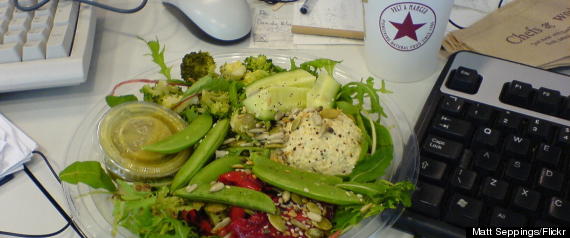
All work and no play makes Jack a dull boy. It also hurts Jack's health and has a negative impact on his relationships and work life.
Today, there are more ways to overwork yourself than ever. And while refusing vacation time, eating lunch at your desk or never shutting off your work email might seem like good ways to impress the boss, they also could have dire consequences for your health down the road.
Researchers and psychologists have been arguing for decades about what constitutes "workaholism," and whether it is a disorder at all. Regardless, since the term started being thrown around in the 1970s, a mountain of evidence has piled up showing that workaholics display many of the same characteristics as those addicted to drugs or alcohol, such as compulsively engaging in behavior that is ultimately destructive.
According to a new study published in the Journal of Management, there is a significant difference between being engaged at work and being addicted to it. While the former is characterized by hard work because the worker is passionate about the job, the latter is often motivated by negative feelings like guilt and compulsion.
The problem is, workaholism is the rare mental health issue that can often have positive rewards in the short term -- namely, the praise of a happy boss. That's one reason psychologist Bryan Robinson once called workaholism “the best-dressed mental health problem.”
So if you're trying to wean yourself off your work addiction but just having a little difficulty, here are some things to keep in mind.
Not taking vacations hurts your career.
Americans left some $52.4 billion worth of unused vacation time on the table in 2013. That makes ditching vacation both one of the most costly and common ways Americans overwork themselves.
Workers that don't take vacation were also found to be less productive and score lower on performance reviews, a 2006 study found.
 Three-quarters of American workers don't use all their vacation time, according to an August 2014 study.
Three-quarters of American workers don't use all their vacation time, according to an August 2014 study.
Your brain needs breaks.
OK, so maybe you're good about vacations, but do you also leave time to take a break or two during the day? Giving your brain some down time is essential to increasing productivity. A recent study found that the ideal work-to-break ratio should be 52 minutes of work followed by a 17-minute break.
The study is backed up by several others that have found giving your brain some time to relax and day dream increases productivity, problem-solving and creativity.
Eating lunch at your desk is bad for you.
For one, a lunch break is a perfect time to recharge your brain. But even just the physical activity of getting up and away from your desk can help improve productivity and stave off obesity. A recent U.K. study found that people who ate more meals at work were more likely to be overweight.
What's more, experts agree that grabbing lunch with co-workers and clients can be a great way to network and further your career.
 We don't need to mention that skipping lunch altogether is maybe the worst thing you can do.
We don't need to mention that skipping lunch altogether is maybe the worst thing you can do.
Constantly checking email wastes your life.
No matter what you tell yourself, constantly being on your work email isn't helping your state of mind or your productivity. A 2012 study found that when workers were forced to take a five-day break from work email they experienced less stress and became more efficient at completing work tasks. The hiatus even led to workers having "more natural, variable heart rates."
Workers who answer emails late in to the evening were also more likely to be exhausted the next day and hence less engaged, two 2014 studies found.
You're probably hurting your relationship.
Being addicted to work can cause serious rifts between partners in romantic relationships. Since workaholism can be thought of in a similar way to substance addiction, workaholics often prioritize their job over their friends and family. For example, those addicted to work can leave a disproportionate amount of domestic duties to spouses who have a more balanced approach to their careers.
Marriages involving a workaholic are twice as likely to end in divorce, a 1999 study found. For those that stay together, the psychological damage can be considerable. Kids of workaholics have been found to experience greater levels of depression and anxiety than the children of alcoholics.
You can't keep it up forever.
In short, workaholics burn out. What may begin as simply spending a few extra hours at the office every week can quickly spiral into much more destructive behavior because workaholics don't take the time to give themselves a break, CNNMoney reports. All that nonstop activity can result in bad personal habits and ultimately lead to what one expert called "incapacitating ‘burnout.’”
 Studies have shown that limiting workers to a 40-hour week is the best way to maintain long-term productivity.
Studies have shown that limiting workers to a 40-hour week is the best way to maintain long-term productivity.
It's bad for your co-workers and employers.
Having workers who take on too much stress, as workaholics often do, isn't just bad for the employee -- it's bad for companies and co-workers, too. Businesses lose an estimated $300 billion in productivity due to stress each year, according to the World Health Organization.
But that stress can also have collateral damage on co-workers. Since workaholics tend to be perfectionists, they can often put added -- and often unnecessary -- stress on their colleagues, according to experts.
And even worse for you.
In short, workaholism has been linked with a laundry list of disorders, including alcoholism, sleep problems, heart disease, depression and anxiety, weight gain, high blood pressure and even premature death.
The good news is there are resources available for those who feel they may be losing the ability to balance their personal and work lives. Workaholics Anonymous is a 12-step program based on the one designed for recovering alcoholics. It's just one of many ways people can learn to set clear boundaries between the office and the home, according to CNNMoney.
